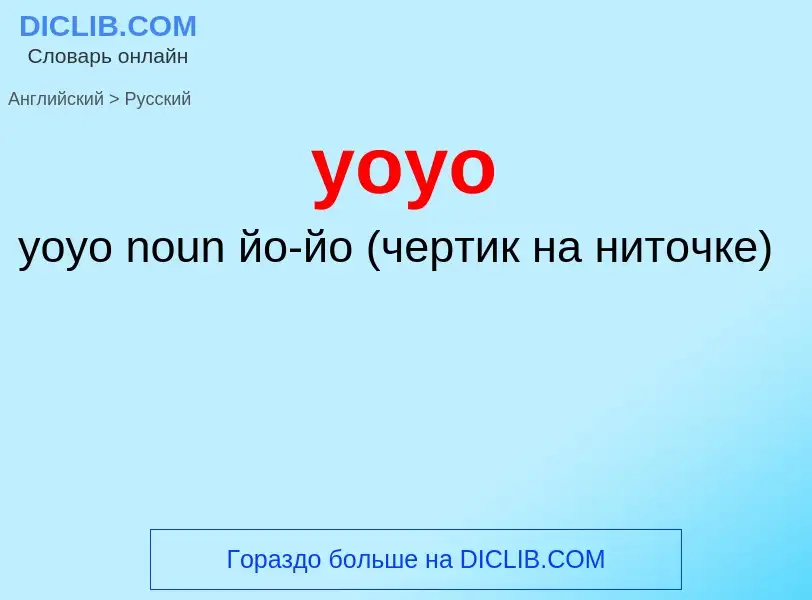Translation and analysis of words by artificial intelligence
On this page you can get a detailed analysis of a word or phrase, produced by the best artificial intelligence technology to date:
- how the word is used
- frequency of use
- it is used more often in oral or written speech
- word translation options
- usage examples (several phrases with translation)
- etymology
yoyo - translation to English
['jəujəu]
синоним
существительное
общая лексика
йо-йо (чертик на ниточке)
['jəujəu]
нефтегазовая промышленность
метод морской сейсмической разведки
прилагательное
['jəujəujəu'jəu]
просторечие
неустойчивый
зыбкий
шаткий
существительное
['jəujəu]
общая лексика
йо-йо
чёртик на ниточке (игрушка)
сленг
флюгер
беспринципный человек
просторечие
тупица
болван
простофиля
ротозей
профессионализм
устройство для прекращения вращения космического аппарата
глагол
общая лексика
колебаться
быть в нерешительности
постоянно меняться
просторечие
ездить взад-вперёд
Definition
Wikipedia

A yo-yo (also spelled yoyo) is a toy consisting of an axle connected to two disks, and a string looped around the axle, similar to a spool. It is an ancient toy with proof of existence since 500 BCE. The yo-yo was also called a bandalore in the 17th century.
It is played by holding the free end of the string known as the handle (by inserting one finger—usually the middle or ring finger—into a slip knot), allowing gravity (or the force of a throw and gravity) to spin the yo-yo and unwind the string (similar to how a pullstring works). The player then allows the yo-yo to wind itself back to the player's hand, exploiting its spin (and the associated rotational energy). This is often called "yo-yoing" or "playing yo-yo".
In the simplest play, the string is intended to be wound on the spool by hand; the yo-yo is thrown downward, hits the end of the string then winds up the string toward the hand, and finally the yo-yo is grabbed, ready to be thrown again. One of the most basic tricks is called the sleeper, where the yo-yo spins at the end of the string for a noticeable amount of time before returning to the hand.






![kylix]], c. 440 BC, [[Antikensammlung Berlin]] (F 2549) kylix]], c. 440 BC, [[Antikensammlung Berlin]] (F 2549)](https://commons.wikimedia.org/wiki/Special:FilePath/Yo-yo player Antikensammlung Berlin F2549.jpg?width=200)

